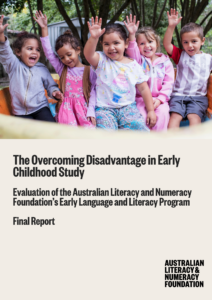 Between a child’s first 1,000 days and the start of school, children engage in an intense period of curiosity and development. During these two years, children require adult-guided learning in order to effectively build oral language and early literacy skills in order to be ready for later formal classroom learning. This doesn’t happen automatically.
Between a child’s first 1,000 days and the start of school, children engage in an intense period of curiosity and development. During these two years, children require adult-guided learning in order to effectively build oral language and early literacy skills in order to be ready for later formal classroom learning. This doesn’t happen automatically.
Oral language and early literacy skills are the vital multipliers that underpin access to education, social, economic and other life opportunities. Australian and international research consistently attest to the importance of these domains.
To effectively address educational disparities, oral language and early literacy development must be a priority before children start school.
ALNF is pleased to present our contribution to national efforts for systemic educational change – with its Early Language and Literacy (EL&L) Program and the Early Language and Literacy Developmental Index (ELLDI).
We invite you to read the Overcoming Disadvantage in Early Childhood Study: evaluation of the Australian Literacy and Numeracy Foundation’s (ALNF) Early Language and Literacy Program Final Report (ODEC Report).
It confirms that the EL&L Program has closed the oral language and early literacy learning gap for children in marginalised communities in the year before school (p5).
It also introduces a world-first scale for 2- to 5-year-olds called the Early Language and Literacy Development Index (ELLDI). Uniquely, it can be deployed by local educators in early childhood education and care (ECEC) settings and in the early years of primary (it also extends to 8-year-olds) as a formative assessment to provide powerful insights to inform reflective practice.
The EL&L Program, accompanied by the ELLDI, constitutes evidence-informed practice in the early years. It promotes high quality language and pre-literacy engagement with children and can close the educational gap, particularly in communities where the vulnerabilities are most widespread.
The EL&L Program’s ultimate goal is sustainable, community-driven quality language and literacy teaching and learning flourishing in Australia (with international scope) towards equitable opportunities for all.
In order to achieve sustained change, the EL&L Program incorporates a place-based and community-led approach, empowering local adults to break the cycle of entrenched oral language and early literacy inequity.
It generates an opportunity to connect services in health and education, and leverages existing infrastructure and workforces.
EL&L and the ELLDI, in the hands of local educators and other service providers, informs and strengthens their everyday work with children as well as conversations with parents/carers and families.
Local adults undertake evidence-informed training and mentoring1 to learn strategies to support children’s oral language and early literacy growth, equipped with robust information via the ELLDI feedback about each child’s growth trajectory.
The ODEC Report shows that EL&L with the ELLDI is a powerful program that maximises children’s oral language and early literacy growth.
Positive strategic change is achievable.
Acknowledgements
This seminal work was made possible with a major grant from the Eureka Benevolent Foundation and with the support of the CAGES Foundation. We thank them for their visionary support. They understand the vital role that oral language and early literacy enrichment in the years prior to school plays in setting children up for positive educational experiences, and the myriad of life opportunities which flow from that. They also know that disadvantaged children are the least likely to receive support in their language and pre-literacy development.
Sign up to our email list.